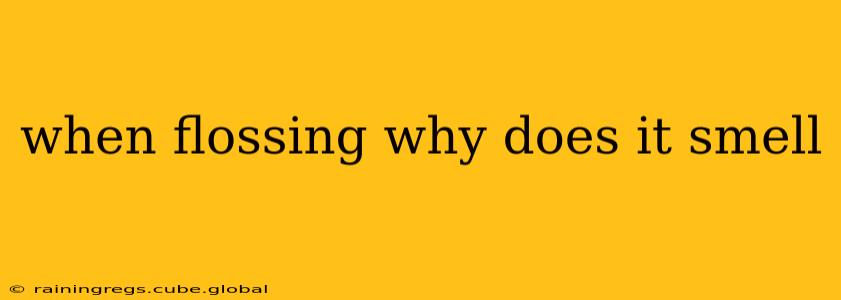Flossing is a crucial part of maintaining good oral hygiene, yet many people are surprised by the sometimes unpleasant smells emanating from their floss after use. This isn't just about bad breath; it's a window into the health of your mouth and a potential sign of underlying issues. Let's delve into why flossing can smell and what you can do about it.
What Causes the Smell When Flossing?
The smell you encounter while flossing is primarily due to bacteria and the byproducts of their activity. Your gums and teeth create a perfect environment for bacterial colonies to flourish. These bacteria feed on food particles trapped between your teeth, producing volatile sulfur compounds (VSCs). These VSCs are responsible for the characteristic "rotten egg" smell associated with bad breath (halitosis).
Flossing dislodges these food particles and bacteria, bringing them into contact with the floss. The smell isn't necessarily a reflection of how well you've been brushing, but rather a clear indication that bacteria and food debris are present. The stronger the smell, the more likely it is that you have a significant bacterial build-up.
Why is My Floss Smelling Worse Than Usual?
Several factors can contribute to a more intense smell while flossing:
-
Infrequent flossing: The longer you go between flossing sessions, the more bacteria and food debris accumulate, leading to a stronger odor.
-
Poor brushing technique: Insufficient brushing doesn't remove all food particles, leaving plenty for bacteria to feast on.
-
Gum disease: Gingivitis and periodontitis (gum disease) create pockets where bacteria can thrive, leading to significantly worse smells during flossing. Inflamed gums are more prone to bleeding, further exacerbating the issue.
-
Dietary choices: Certain foods, such as onions and garlic, can contribute to bad breath, which will be more noticeable when flossing.
-
Medical conditions: Some medical conditions, such as diabetes and dry mouth, can contribute to increased bacterial growth and therefore a stronger smell.
How Can I Prevent the Smell While Flossing?
The good news is that the smell is usually manageable with proper oral hygiene practices. Here are some key steps:
-
Floss daily: Make flossing a daily habit to prevent the build-up of bacteria and food particles.
-
Brush effectively: Use a fluoride toothpaste and brush for at least two minutes, twice a day, paying attention to the gum line.
-
Use an antimicrobial mouthwash: An antimicrobial mouthwash can help reduce the number of bacteria in your mouth.
-
See your dentist regularly: Regular dental check-ups and professional cleanings are essential for removing plaque and tartar, preventing gum disease, and maintaining good oral health.
-
Adjust your diet: Limiting foods known to contribute to bad breath can help.
-
Stay hydrated: Drinking plenty of water helps wash away food particles and bacteria.
What if the Smell Persists Despite Good Oral Hygiene?
If the smell persists despite diligently following good oral hygiene practices, it's crucial to consult your dentist or periodontist. A persistent foul odor during flossing could indicate an underlying oral health problem, such as gum disease or even a more serious condition. Your dentist can diagnose the cause and recommend appropriate treatment.
Does the Smell Indicate the Success of Flossing?
While a smell indicates bacterial presence, it's not a direct measure of how effective your flossing is. You might still be successfully removing plaque and debris even if there's a slight odor. The key is consistency and thoroughness.
Is there a way to make flossing less smelly?
While you can't entirely eliminate the smell (as it's a byproduct of removing bacteria), improving your oral hygiene as mentioned above will significantly reduce it. Using a mint-flavored floss may also help mask the odor temporarily.
By understanding the causes and taking preventative measures, you can keep your mouth healthy and minimize the unpleasant smells associated with flossing. Remember, a slightly unpleasant smell is often a sign that flossing is doing its job! However, persistent strong odors warrant a visit to your dentist.
